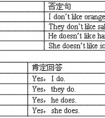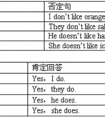Let's________thebooks________thedesk.[ ]A.puts;onB.put;belowC.put;on-四年级英语
I often do my homework in the evening.
3. under
在------底下 There is a ball under the bed.
4. near
在------附近 There is a book shop near our school.
5. in front of
在------前面 A boy is standing in front of the house.
6. beside
在------旁边 A football is beside the door.
7. next to
紧挨着 There is a bus station next to No. 13 Middle School.
8. over
在------正上方 A bridge is over the river.
9. on the left
在------左边 The bookstore is on the left.
10. on the right
在------右边 The hospital is on the right.
11. before
在……之前 Mike sits before me.
12. after
在------以后 He went home after school.
13. in the middle
在------中间 The road is in the middle.
14. at
(1) 在------(小地方) I am at school today. I was at home yesterday.
(2) 在------(点钟) I usually go to school at 8:00 am.
(3)看一看 Look at the blackboard.
(4) 在中午 at noon
15. behind
在------后面 There is a broom behind the door.
16.for
(1)给 This present is for you.
(2)为了 Thank you for telling me the way to the zoo.
(3)作为 We have some chips and hamburgers for lunch.
17.to
(1) 到 Take your sport shoes to the P.E class.
(2) 致 Happy birthday to you. Give it to your friend.
18. from
来自 I am from China. = I come from China.
19. from --- to
从------到------ Line up from shorter to taller.
We have class from Monday to Friday.
20. of
------的 He is a student of Kama School.
21. by
(1)在------之前 We must be at home by 6 o’clock.
(2)乘------交通工具 People can go to the moon by spaceship.
I go to school by bus.
22.with
(1) 用 I write a letter with a pen.
(2) 和------一起 He went to Shenzhen with his parents.
23. between
在------与------之间 There is a football match between Class One and Class Three.
24. into
到------里 Sharks can dive into the deep cold water.
25. like
(1)象------ The twins are like their father.
(2)长相------怎样? What’s he like?
26. up
向上 Put up your hands if you have any questions.
27. down
向下 Put down all the books here.
28. about
(1) 大约;关于 It’s about 6:00 now.
(2) ------怎么样? What about---? How about---?
29. what for
为什么 But what for?
早、午、晚要用in,at黎明、午夜、点与分。
年、月、年月、季节、周,阳光、灯、影、衣、冒in。
将来时态in...以后,小处at大处in。
有形with无形by,语言、单位、材料in。
特征、方面与方式,心情成语惯用in。
介词at和to表方向,攻击、位置、恶、善分。
日子、日期、年月日,星期加上早、午、晚,
收音、农场、值日on,关于、基础、靠、著论。
着、罢、出售、偷、公、假,故意、支付、相反,准。
特定时日和"一……就",on后常接动名词。
年、月、日加早、午、晚,of之前on代in。
步行、驴、马、玩笑on,cab,carriage则用in。
at山脚、门口、在当前,速、温、日落、价、核心。
工具、和、同随with,具有、独立、就、原因。
就……来说宾译主,对、有、方状、表细分。
海、陆、空、车、偶、被by,单数、人类know to man。
this、that、tomorrow,yesterday,next、last、one。
接年、月、季、星期、周,介词省略已习惯。
over、under正上下,above、below则不然,
若与数量词连用,混合使用亦无关。
beyond超出、无、不能,against靠着,对与反。
besides,except分内外,among之内along沿。
同类比较except,加for异类记心间。
原状because of,、 owing to、 due to表语形容词
under后接修、建中,of、from物、化分。
before、after表一点, ago、later表一段。
before能接完成时,ago过去极有限。
since以来during间,since时态多变换。
与之相比beside,除了last but one。
复不定for、找、价、原,对、给、段、去、为、作、赞。
快到、对、向towards,工、学、军、城、北、上、南。
but for否定用虚拟,复合介词待后言。
ing型由于鉴,除了除外与包合。
之后、关于、在......方面,有关介词须记全。
in内to外表位置,山、水、国界to在前。
考点名称:祈使句
祈使句:
表达说话人对对方的叮嘱、劝告、希望、禁止、请求或命令等。
祈使句一般以动词原形开头,无时态和数的变化,句末用句号或感叹号,用降调。
祈使句的肯定结构是:
动词原形+其他;
否定结构是:
Don't+动词+其他。
另外,Let's也能引导祈使句, 其后接动词原形。
例:Please open the door. 请打开门。
Don't be late next time. 下次别迟到。
Don't run on the train. 不要在火车上跑。
Let's go to school. 让我们去上学。祈使句含义:
1. 表请求
Pass me the sugar, please. 请把糖递给我。
2. 表命令
Put up your hands. 举手。
Fill in this form. 把这个表填好。
3. 表建议
Let’s have dinner together. 我们共进晚餐吧。
4. 表邀请
Come in and have a seat. 进来请坐。
Help yourself to some fruits. 请吃水果。
5. 表警告
Hurry up or you will be late.抓紧点,不然你要迟到了。
Do that again and you”ll be in trouble.要是再干那事,你会有麻烦的。
6. 表禁止
Don’t touch the exhibits.不要触摸展品。
Don’t play on the road.不要在马路上玩耍。
7. 表叮嘱
Be sure to get there before nine. 务必在九点前赶到那里。
Take care not to catch cold. 小心别着凉了。
8. 表号召
Workers of all countries, unite! 全世界工人阶级联合起来!
9. 表祝愿
Have a good trip. 祝你旅途愉快。
祈使句一般特点:
1.谓语大都是表示行为动作的动词或动词性词语,表示的动作是未然的。
2.主语一般是第二人称代词“你、你们”,往往省去。也有时用第一人称“咱们”作主语。- 祈使句用法口令:
祈使句无主语,主语you常省去;
动词原形谓语当,句首加don't否定变;
朗读应当用降调,句末常标感叹号。
- 最新内容
- 相关内容
- 网友推荐
- 图文推荐
| [家长教育] 孩子为什么会和父母感情疏离? (2019-07-14) |
| [教师分享] 给远方姐姐的一封信 (2018-11-07) |
| [教师分享] 伸缩门 (2018-11-07) |
| [教师分享] 回家乡 (2018-11-07) |
| [教师分享] 是风味也是人间 (2018-11-07) |
| [教师分享] 一句格言的启示 (2018-11-07) |
| [教师分享] 无规矩不成方圆 (2018-11-07) |
| [教师分享] 第十届全国教育名家论坛有感(二) (2018-11-07) |
| [教师分享] 贪玩的小狗 (2018-11-07) |
| [教师分享] 未命名文章 (2018-11-07) |


![Where is my bag? It's _____________the desk. [ ]A. inB. behindC. on-五年级英语](http://www.00-edu.com/d/file/ks/4/1/44/2019-08-20/small3591750882d019139d20d416cb80f64f1566236486.jpg)
![Where's my pen? [ ]A. It's in the desk.B. It's under the desk.C. It's on the desk.-四年级英语](http://www.00-edu.com/d/file/ks/4/1/44/2019-08-20/small4157828d9d6bc1a02bdbdd4d3ffccde61566236790.jpg)

![I can call you _____________ the phone.[ ]A. inB. atC. onD. of-六年级英语](http://www.00-edu.com/d/file/ks/4/1/44/2019-08-20/small17adfe158040ebb20380cac1c81e7ec81566232881.jpg)
